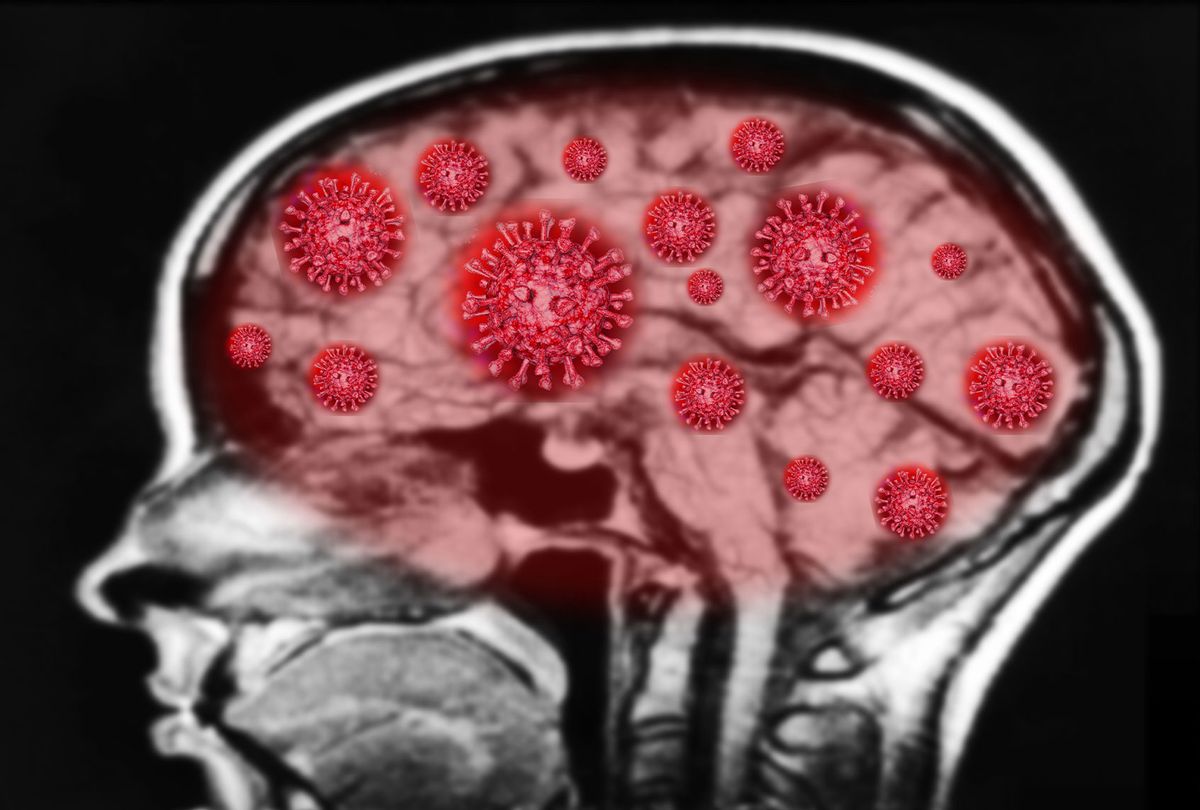While many cases of COVID-19 — particularly among the vaccinated — are mild, the virus' potential to incapacitate or impair its victims cannot be underestimated. For one, SARS-CoV-2, the virus that causes COVID, can trigger literal brain damage. In addition to all the other organs that can be affected by COVID, such as the lungs, heart and kidneys, the virus has found a way to worm inside the skull. And the more we learn about this relationship, the more concerning it becomes.
A new study published in the journal Psychiatry Research suggests severe cases of COVID are associated with an 11 percent increase in risk for schizophrenia, with the authors suggesting that schizophrenia should probably be added to the growing constellation of symptoms known as long COVID.
The good news is that this trend only seems to apply to people who had severe cases, so mere infection doesn't increase this risk, just hospitalization. It also isn't clear if COVID is directly causing this increase. But it adds to a growing body of research that links COVID infection to serious mental health deficits.
To find this link, an international trio of researchers analyzed two public genetic databases, one for mere COVID infections (122,000 cases) and another with infections requiring hospitalization (32,000 cases) and a combined 4.5 million controls. To better understand the cause and effect relationship, they applied a method called Mendelian randomization, a study design used since the early '90s that relies on principles pioneered by Gregor Mendel, known as the father of modern genetics.
The researchers used a few different models to make sure their results were accurate.
Since early on in the pandemic, patients with schizophrenia have been reported to be more likely to die from COVID, with one 2021 study of New Yorkers finding schizophrenia patients were almost three times more likely to perish.
"While the viral infection may not increase the risk for schizophrenia, COVID-19 hospitalization was associated with an 11% increase in the risk of schizophrenia," they reported.
While an 11 percent increase may not seem like a lot, it's a big deal when considering how debilitating schizophrenia can be. This mental disorder is often misunderstood and stigmatized, even by mental health professionals, no thanks to misrepresentations in film and TV.
Want more health and science stories in your inbox? Subscribe to Salon's weekly newsletter The Vulgar Scientist.
The National Institute of Mental Health defines schizophrenia as experiencing a "distorted" reality punctuated by disordered thoughts, hallucinations and delusions. But it doesn't make people more violent or prone to breaking the law. In fact, "people with schizophrenia are more likely than those without the illness to be harmed by others," according to NIMH.
Since early on in the pandemic, patients with schizophrenia have been reported to be more likely to die from COVID, with one 2021 study of New Yorkers finding schizophrenia patients were almost three times more likely to perish, second only to age as a risk factor for mortality. This tracks with data available since the '80s showing people with schizophrenia are more prone to premature death.
Mental health disorders have experienced a steep rise since the pandemic began, with increases in depression, anxiety, post-traumatic stress disorder, insomnia and more. Finding a link between COVID hospitalization and schizophrenia adds evidence to how severe this illness can be.
However, the researchers note several limitations to their research, including using genetic datasets of people with only European ancestry. They were also unable to factor in the environmental variables, "which are critical for both schizophrenia and COVID-19," the authors report. But, as mentioned, they tried to control for this by using different models.
They conclude that schizophrenia should be explored as one of the possible symptoms of long COVID, a condition characterized by long-term health problems that linger for months or even years. Many people with long COVID report "brain fog" or cognitive dysfunction, as well as extreme fatigue, headaches, heart palpitations, joint pain and blood disorders. A recent study from Scotland compared 33,000 people who had contracted COVID with 62,000 never infected individuals and found that 1 in 20 people still hadn't recovered between six and 18 months after infection. Another 42 percent only partially recovered.
It may seem like COVID is associated with so many diseases, it begs the question: What health problem can't you link to the virus? But the reason why COVID appears so overwhelming and prevalent is because SARS-2 is so good at infecting so many different parts of the body. This is because the receptor SARS-2 uses to enter cells — called the ACE2 receptor — is everywhere in our body, giving the virus many different ways to attack. This manifests as multiple types of disease.
Schizophrenia is still an undertreated condition that raises the risk of death and serious diseases. A recent study in Molecular Psychiatry looked at hospitalizations in France that were non-COVID related and found "Patients with schizophrenia were less admitted for several somatic diseases (especially cancer, circulatory and digestive diseases and stroke)."
It seems that COVID is no exception and more attention should be given to this relationship.

Shares